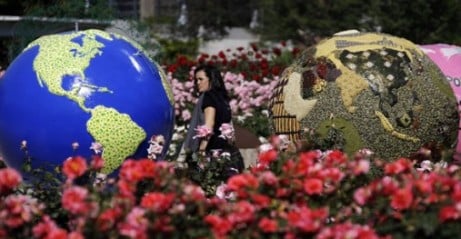
“The multipolar world has become a global reality, recognized as a near certainty by no less an authority than the U.S. intelligence community,” writes Elizabeth Dickinson in the latest issue of Foreign Policy. While missing the complexities of the debate about the global balance of power, the article details some of the historical moments when a multipolar world was discussed.
“For most of its geopolitical life, ‘multipolar’ has been a synonym for America-bashing, whether by erstwhile allies in the Cold War or an anxious Russia grappling with its post-superpower status…today, Secretary of State Hillary Clinton promises to tilt the balance ‘away from a multipolar world and toward a multipartner world.’”
“1987: In The Rise and Fall of the Great Powers, Yale University historian Paul Kennedy predicts the balance of military power will shift over the coming 20 to 30 years, creating a truly multipolar world around 2009. ‘If the patterns of history are any guide, the multipolar economic balance will begin to shift the military balances,’ he later tells the New York Times.
“December 25, 1991: The Soviet Union ceases to exist, eliminating the second Cold War ‘pole’ and launching a debate about the new world order. ‘Global politics,’ Samuel Huntington argues later in Foreign Affairs, ‘is now passing through one or two uni-multipolar decades before it enters a truly multipolar 21st century.’
“April 23, 1997: Fear of U.S. unipolarity inspires China and Russia to sign a ‘Joint Declaration on a Multipolar World and the Establishment of a New International Order’ in Moscow.
“February 2, 2000: Secretary of State Madeleine Albright, who earlier dubbed the United States the ‘indispensable nation,’ claims the U.S. is not looking to ‘establish and enforce’ a unipolar world. Economic integration, she says, has already created ‘the kind of world that might even be called ‘multipolar.’’
“January 26, 2007: A New York Times editorial describes the ‘emergence of a multipolar world,’ with China taking ‘a parallel place at the table along with other centers of power, like Brussels or Tokyo.’
“November 20, 2008: In its ‘Global Trends 2025’ report, the U.S. National Intelligence Council declares the advent of a ‘global multipolar system’ as one of the world’s ‘relative certainties’ within two decades.
“2009: U.S. President Barack Obama takes office with what many deem a multipolar worldview, prioritizing rising powers such as Brazil, China, India, and Russia. ‘We will lead by inducing greater cooperation among a greater number of actors and reducing competition, tilting the balance away from a multipolar world and toward a multipartner world,’ Secretary of State Hillary Clinton says in a July address.
“July 22, 2009: ‘We are trying to build a multipolar world,’ U.S. Vice President Joseph Biden declares in a speech in Ukraine.”
Photo from AP.